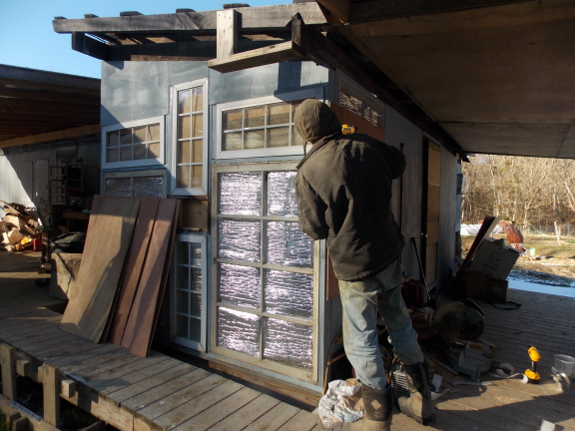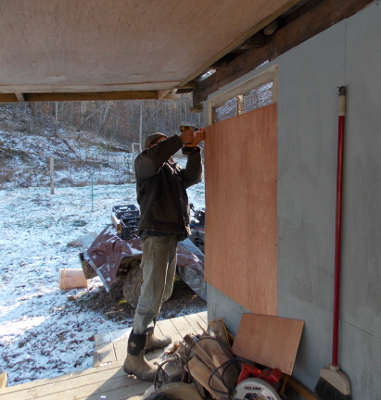
Is a hot water heater fuel efficient?

During the negotiation phase, one of Mark's selling points for buying a hot water heater
was energy savings. While that sounds counterintuitive, I could
see his logic. Since we previously heated water in pots on top of
the electric stove, it made sense that a water heater (turned on for an hour a day) could do the job more efficiently. But did it?
 I
don't really know for sure, but our electric bills have suggested Mark
was right. Despite a December that averaged two degrees colder
than in 2012, we used precisely the same number of kilowatt-hours per
day in 2012 and 2013. (The cold is relevant because Mark heats the
East Wing with electric space heaters unless it's really frigid, so
colder weather means we use more juice.)
I
don't really know for sure, but our electric bills have suggested Mark
was right. Despite a December that averaged two degrees colder
than in 2012, we used precisely the same number of kilowatt-hours per
day in 2012 and 2013. (The cold is relevant because Mark heats the
East Wing with electric space heaters unless it's really frigid, so
colder weather means we use more juice.)
 Of course, there are other factors at play. We've been nibbling away at closing in the windows in the East Wing all through December, and I'll bet that extra insulation cut Mark's heat use.
Of course, there are other factors at play. We've been nibbling away at closing in the windows in the East Wing all through December, and I'll bet that extra insulation cut Mark's heat use.
The great thing about committing to staying in one spot for the rest of
your life is that every little project slowly accumulates on top of the
last, and tiny steps eventually make progress. Maybe in ten years,
our insulation levels will be so high that our winter electric bill is
no higher than summer. At least that's something to work toward.
Want more in-depth information? Browse through our books.
Or explore more posts by date or by subject.
About us: Anna Hess and Mark Hamilton spent over a decade living self-sufficiently in the mountains of Virginia before moving north to start over from scratch in the foothills of Ohio. They've experimented with permaculture, no-till gardening, trailersteading, home-based microbusinesses and much more, writing about their adventures in both blogs and books.
Want to be notified when new comments are posted on this page? Click on the RSS button after you add a comment to subscribe to the comment feed, or simply check the box beside "email replies to me" while writing your comment.

Being tightly insulated, and with water completely surrounding the heating elements, a water heater is vastly more efficient than a stove at heating water. However, this statement depends on equal volumes of water being heated between the water heater and the stove.
If your requirement for hot water is very small compared to the water heater (only need 5 gal from a 50 gal heater), you may be better off heating on the stove. Even still, it's a ton easier to turn the water heater on just long enough to heat 15 gal on top, and probably uses the same kWh.
An electric heater is by definition a lost cause w.r.t. efficiency if the electricity is generated by a steam turbine/generator combination. These stations are powered by heat engines using the Rankine cycle.
The thermal efficiency of a heat engine is determined by the inlet (hot) and outlet (cold) temperatures. The inlet temperature is limited by the available materials (usually steel) and the outlet temperature is usually limited by cooling water temperature. This limits the efficiency of such a power station to around 35%. That means that 65% of the energy input (usually coming from fossil fuels) us lost at the power plant, long before it gets to the heater. Factor in transport and conversion losses and you are probably looking at 20-30% efficiency.
A gas-fired heater can reach 80% efficiency easily. Of course you have to factor in the losses for transporting the gas. But with that included it will still be much better.
Disregarding the fact that using electricity for heating is inherently inefficient, a hot water heater should be much more efficient that using a stove.
An electric heater is by definition a lost cause w.r.t. efficiency if the electricity is generated by a steam turbine/generator combination. These stations are powered by heat engines using the Rankine cycle.
The thermal efficiency of a heat engine is determined by the inlet (hot) and outlet (cold) temperatures. The inlet temperature is limited by the available materials (usually steel) and the outlet temperature is usually limited by cooling water temperature. This limits the efficiency of such a power station to around 35%. That means that 65% of the energy input (usually coming from fossil fuels) us lost at the power plant, long before it gets to the heater. Factor in transport and conversion losses and you are probably looking at 20-30% efficiency.
A gas-fired heater can reach 80% efficiency easily. Of course you have to factor in the losses for transporting the gas. But with that included it will still be much better.
Disregarding the fact that using electricity for heating is inherently inefficient, a hot water heater should be much more efficient that using a stove.
Whilst I do think that a hot water heater is fuel efficient, it will depend completely on the type and age of your unit. If you have an old one, of course it is going to be relatively inefficient compared to a newer unit - it simply needs a little help to keep up. The newer units on the market, however, are known to be quite fuel efficient because new technologies have been developed.
Thanks for sharing this article!